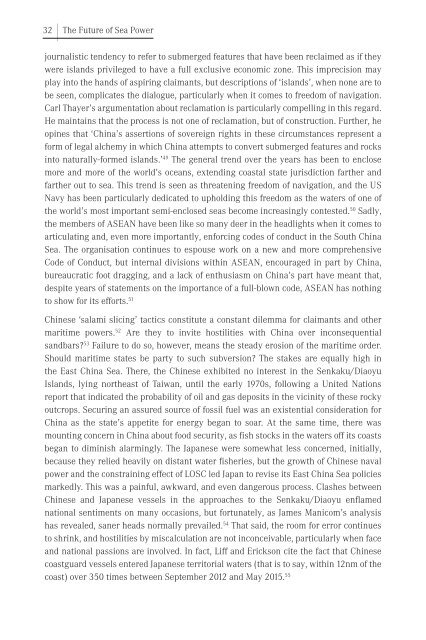THE FUTURE OF SEA POWER
SPC2015_Proceedings
SPC2015_Proceedings
Create successful ePaper yourself
Turn your PDF publications into a flip-book with our unique Google optimized e-Paper software.
32 |<br />
The Future of Sea Power<br />
journalistic tendency to refer to submerged features that have been reclaimed as if they<br />
were islands privileged to have a full exclusive economic zone. This imprecision may<br />
play into the hands of aspiring claimants, but descriptions of ‘islands’, when none are to<br />
be seen, complicates the dialogue, particularly when it comes to freedom of navigation.<br />
Carl Thayer’s argumentation about reclamation is particularly compelling in this regard.<br />
He maintains that the process is not one of reclamation, but of construction. Further, he<br />
opines that ‘China’s assertions of sovereign rights in these circumstances represent a<br />
form of legal alchemy in which China attempts to convert submerged features and rocks<br />
into naturally-formed islands.’ 49 The general trend over the years has been to enclose<br />
more and more of the world’s oceans, extending coastal state jurisdiction farther and<br />
farther out to sea. This trend is seen as threatening freedom of navigation, and the US<br />
Navy has been particularly dedicated to upholding this freedom as the waters of one of<br />
the world’s most important semi-enclosed seas become increasingly contested. 50 Sadly,<br />
the members of A<strong>SEA</strong>N have been like so many deer in the headlights when it comes to<br />
articulating and, even more importantly, enforcing codes of conduct in the South China<br />
Sea. The organisation continues to espouse work on a new and more comprehensive<br />
Code of Conduct, but internal divisions within A<strong>SEA</strong>N, encouraged in part by China,<br />
bureaucratic foot dragging, and a lack of enthusiasm on China’s part have meant that,<br />
despite years of statements on the importance of a full-blown code, A<strong>SEA</strong>N has nothing<br />
to show for its efforts. 51<br />
Chinese ‘salami slicing’ tactics constitute a constant dilemma for claimants and other<br />
maritime powers. 52 Are they to invite hostilities with China over inconsequential<br />
sandbars? 53 Failure to do so, however, means the steady erosion of the maritime order.<br />
Should maritime states be party to such subversion? The stakes are equally high in<br />
the East China Sea. There, the Chinese exhibited no interest in the Senkaku/Diaoyu<br />
Islands, lying northeast of Taiwan, until the early 1970s, following a United Nations<br />
report that indicated the probability of oil and gas deposits in the vicinity of these rocky<br />
outcrops. Securing an assured source of fossil fuel was an existential consideration for<br />
China as the state’s appetite for energy began to soar. At the same time, there was<br />
mounting concern in China about food security, as fish stocks in the waters off its coasts<br />
began to diminish alarmingly. The Japanese were somewhat less concerned, initially,<br />
because they relied heavily on distant water fisheries, but the growth of Chinese naval<br />
power and the constraining effect of LOSC led Japan to revise its East China Sea policies<br />
markedly. This was a painful, awkward, and even dangerous process. Clashes between<br />
Chinese and Japanese vessels in the approaches to the Senkaku/Diaoyu enflamed<br />
national sentiments on many occasions, but fortunately, as James Manicom’s analysis<br />
has revealed, saner heads normally prevailed. 54 That said, the room for error continues<br />
to shrink, and hostilities by miscalculation are not inconceivable, particularly when face<br />
and national passions are involved. In fact, Liff and Erickson cite the fact that Chinese<br />
coastguard vessels entered Japanese territorial waters (that is to say, within 12nm of the<br />
coast) over 350 times between September 2012 and May 2015. 55


